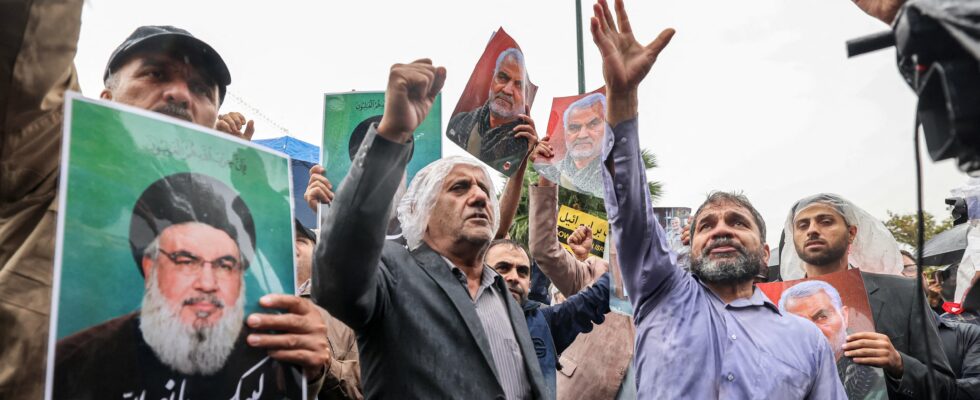The announcement once again shakes up the geopolitics of the Middle East. Shortly after the Israeli announcement, Lebanese Hezbollah confirmed on Saturday September 28 the death of Hassan Nasrallah, leader of the Shiite movement since 1992. This elimination followed a strike by the Israeli army on Friday on its headquarters, in the southern suburbs. from the capital Beirut.
The death of Hassan Nasrallah, then considered the most powerful man in Lebanon at the head of a militia heavily armed by Iran, further weakens the Islamist movement and the Iranian deterrence strategy. For the moment, Iran has reacted to this assassination by reiterating its threat of the “destruction” of Israel. But according to David Rigoulet-Roze, associate researcher at Iris and specialist in Middle East geopolitics, this new blow will force Tehran to change its deterrence strategy… Without risking military escalation.
L’Express: After the death of Hassan Nasrallah, what reaction can we expect from Iran?
That’s the big question mark. Because indeed, there is an intimate link between Hezbollah and Tehran. Hezbollah was created by Iran in the 1980s. However, with the exception of the unprecedented response last April, when for the first time, Iran was forced to respond directly against Israel, In recent months, Iranian power has continued to avoid, above all, entering into an escalatory logic that would put the country in direct confrontation, not only with Israel, but potentially with the United States.
The problem is what I call the “Persian dilemma”: it is the desire not to enter into a confrontation and a logic of escalation despite the fact that Iran is unable not to answer. There is therefore a dilemma for Tehran, given the seriousness of what has just happened.
How important was Hassan Nasrallah to the Iranian regime?
Hassan Nasrallah was a central player in Iranian deterrence. He was the embodiment of Hezbollah and the stature of the commander: a tutelary, masterful figure. He was very close to the Supreme Leader. In addition, he was “sayed”, that is to say recognized as a descendant of the Prophet, as indicated by his black turban. It is very important in Shiite culture, so he had a religious aura among his troops. He had also pledged allegiance to the principles of the Iranian Veleyat, that is to say the recognition of the primacy of the guide [suprême iranien] on the Shiite community as a whole, beyond Iran.
So obviously, he was a fundamental relay of Iranian strategic interests. Therefore, his death can be a game changer [événement qui bouleverse la situation, NDLR] both on the Lebanese scene and at the regional level.
How does the weakening of Hezbollah call into question Iran’s regional strategy?
Until now, part of Iran’s deterrence has been through its proxies. This is what we call the “Axis of muqawamah”, that is to say this myriad of groups which are united in resistance to Israel. First and foremost is Hezbollah, which is the most important.
Today, there are two which are destroyed: Hamas no longer exists, militarily, and Hezbollah is in the process of very advanced weakening. So the problem for Tehran is that its proxies are very weakened in a systemic way. Thus, what constituted the strength of Iranian deterrence, particularly around Israel, is put into perspective. With, potentially, a diminished deterrence for Iran itself. Therefore, the question is how to restore these disincentives.
Could the response take the form of a more intense Iranian military response than last April?
It is the register of the Iranian response that will probably be decisive, not its intensity. Otherwise, what could it be? Instead of sending 350 missiles [sur Israël]send a thousand? It wouldn’t change anything, since in any case, the missiles in question were intercepted last time, and that also gave rise to an Israeli counter-reply in the heart of Iran.
Iran is not in a position to confront Israel or the United States militarily, and those in power know this very well. This is why Iran, to compensate for the weakness of its regular army, had developed two things to protect itself: proxies and [l’armement] ballistic. With, in the background, the potential bomb program [nucléaire]. However, the proxies are weakened today, and ballistics depends on the proxies. Therefore, the question is how Iran will find a solution to protect itself. And it is not by declaring war on Israel.
So what other form of deterrence could Iran use?
The answer could be on another register, such as taking the plunge on nuclear power. Clearly, it would be to make the decision that Iran is no longer just a threshold power. It is a political decision, since, technically, Iran can acquire a nuclear bomb. Until now, Iran has always said that it does not have a program [nucléaire] military vocation, and the United States considered that the decision had not been taken. But that could change. Because at that point, you have a logic of deterrence which is reestablished by protecting Iran. The Iranian state can no longer be attacked.
So can we expect a similar announcement in the coming days?
No, it won’t be as provocative. It would rather be the act of banning [l’accès des installations nucléaires] to inspectors, or possibly to carry out a test [nucléaire] underground, which the Americans will see. Once there has been a trial, that will mean the decision has been made.
.
